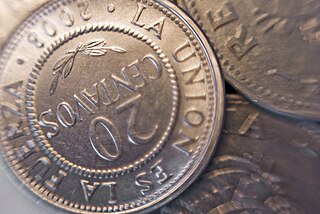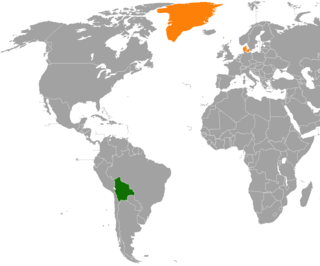
La Paz, officially known as Nuestra Señora de La Paz, also named Chuqi Yapu (Chuquiago) in Aymara, is the seat of government and the de facto national capital of the Plurinational State of Bolivia. With an estimated 789,541 residents as of 2015, La Paz is the third-most populous city in Bolivia. Its metropolitan area, which is formed by La Paz, El Alto and Viacha, makes up the most populous urban area in Bolivia, with a population of 2.3 million. It is also the capital of the La Paz Department.

Sucre is the constitutional capital of Bolivia, the capital of the Chuquisaca Department and the 6th most populated city in Bolivia. Located in the south-central part of the country, Sucre lies at an elevation of 2,810 meters. This relatively high altitude gives the city a cool temperate climate year-round.

Coca is any of the four cultivated plants in the family Erythroxylaceae, native to western South America.

The politics of Bolivia takes place in a framework of a presidential representative democratic republic, whereby the president is head of state, head of government and head of a diverse multi-party system. Executive power is exercised by the government. Legislative power is vested in both the government and the two chambers of parliament. Both the Judiciary and the electoral branch are independent of the executive and the legislature. After the 2014 election, 53.1% of the seats in national parliament were held by women, a higher proportion of women than that of the population.

The economy of Bolivia is the 95th largest economy in the world in nominal terms and the 87th economy in terms of purchasing power parity. It is classified by the World Bank to be a lower middle income country. With a Human Development Index of 0.675, it is ranked 119th.

Upper Peru is a denomination for the land that was governed by the Real Audiencia of Charcas. The denomination originated in Buenos Aires towards the end of the 18th century after the Audiencia of Charcas was transferred from the Viceroyalty of Peru to the Viceroyalty of the Río de la Plata in 1776. It comprised the governorships of Potosí, La Paz, Cochabamba, Chiquitos, Moxos and Charcas.

Juan Evo Morales Ayma, commonly known as Evo Morales, is a Bolivian politician and cocalero activist who has served as President of Bolivia since 2006. Widely regarded as the country's first president to come from the indigenous population, his administration has focused on the implementation of leftist policies, poverty reduction, and combating the influence of the United States and multinational corporations in Bolivia. A socialist, he is the head of the Movement for Socialism (MAS) party.

The Andean Community is a free trade area with the objective of creating a customs union comprising the South American countries of Bolivia, Colombia, Ecuador, and Peru. The trade bloc was called the Andean Pact until 1996 and came into existence when the Cartagena Agreement was signed in 1969. Its headquarters are in Lima, Peru.
Bolivian hemorrhagic fever (BHF), also known as black typhus or Ordog Fever, is a hemorrhagic fever and zoonotic infectious disease originating in Bolivia after infection by Machupo mammarenavirus.

Cochabamba is a city and municipality in central Bolivia in a valley in the Andes mountain range. It is the capital of the Cochabamba Department and the fourth largest city in Bolivia, with a population of 630,587 according to the 2012 Bolivian census. Its name is from a compound of the Quechua words qucha "lake" and pampa, "open plain." Residents of the city and the surrounding areas are commonly referred to as cochalas or, more formally, cochabambinos.

Bolivia competed at the 2004 Summer Olympics in Athens, Greece from 13 to 29 August 2004.

The Bolivia national football team, also known as La Verde or Los Altiplanicos, has represented Bolivia in international football since 1926. Organized by the Bolivian Football Federation (FBF), it is one of the 10 members of FIFA's South American Football Confederation (CONMEBOL).

El Alto is a municipality and the second-largest city in Bolivia, located adjacent to La Paz in Pedro Domingo Murillo Province on the Altiplano highlands. El Alto is today one of Bolivia's fastest-growing urban centers, with a population of 974,754 in 2011. El Alto is the highest major metropolis in the world, with an average elevation of 4,150 m (13,615 ft).
Miss Bolivia is a national beauty pageant in Bolivia.

The Bolivian passport is the official travel document issued to citizens of Bolivia by the Bolivian Government through its specially appointed office, Dirección General de Migración. The document can also be extended abroad via consulate representatives.

The Bolivian river dolphin, a mammal, is a subspecies of the Amazon river dolphin.

Bolivia–Denmark relations refers to the current and historical relations between Bolivia and Denmark. Bolivia has an embassy in Copenhagen, and Denmark has an embassy in La Paz.
The 2011 Bolivian protests were a series of demonstrations by indigenous peoples who opposed the construction of the Villa Tunari – San Ignacio de Moxos Highway through the Isiboro Sécure National Park and Indigenous Territory, similar to the Trans-Amazonian Highway in Brazil, the ancestral lands of over 12,000 indigenous residents, from the Chimane, Yuracaré, and Mojeño-Trinitario peoples. The subcentral TIPNIS, the Confederation of Indigenous Peoples of Bolivia (CIDOB), and the highland indigenous confederation CONAMAQ—supported by other indigenous and environmental groups—organised a march from Trinidad, Beni to the national capital La Paz in opposition to the project, beginning on 15 August 2011.


















